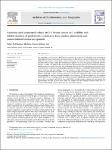Genistein and coumestrol reduce MCF-7 breast cancer cell viability and inhibit markers of preferential metastasis, bone matrix attachment and tumor-induced osteoclastogenesis
Date
2023-05-15Author
Subject
Metadata
Show full item recordAbstract
The propensity of breast cancer to preferentially metastasize to the skeleton is well known. Once established in bone metastatic breast cancers have a poor prognosis due to their ability to promote extensive bone loss which augments tumor burden. Unfortunately, current anti-resorptive therapies for skeletal metastasis are typically prescribed after secondary tumors have formed and are palliative in nature. One group of compounds with the potential to reduce both tumor burden and osteolysis are phytoestrogens (PE), but the mechanisms mediating a beneficial effect are unclear. Therefore, the current study examined the effect of genistein and coumestrol alone or in combination on breast cancer cell number, expression of mediators of preferential skeletal metastasis, bone matrix attachment and tumor-induced osteoclast formation. Results showed that genistein and coumestrol significantly reduced viable cell number in an estrogen receptor dependent manner (p < 0.05), whereas combinations of PE had no effect. In addition, genistein and coumestrol significantly reduced expression of genes driving epithelial to mesenchymal transition (snail), bone attachment (CXCR4 and integrin αV) and osteolysis (PTHrP and TNF-α). In keeping with this genistein and coumestrol significantly suppressed attachment of breast cancer cells to bone matrix and inhibited tumor and RANKL-induced osteoclast formation. Our data suggests that phytoestrogens not only decrease breast cancer cell viability but also antagonize essential tumor bone interactions that establish and drive the progression of skeletal metastasis.
Collections
Publisher
Place of Publication
Journal
Volume
Pagination
Number
Recommended, similar items
The following license files are associated with this item:


